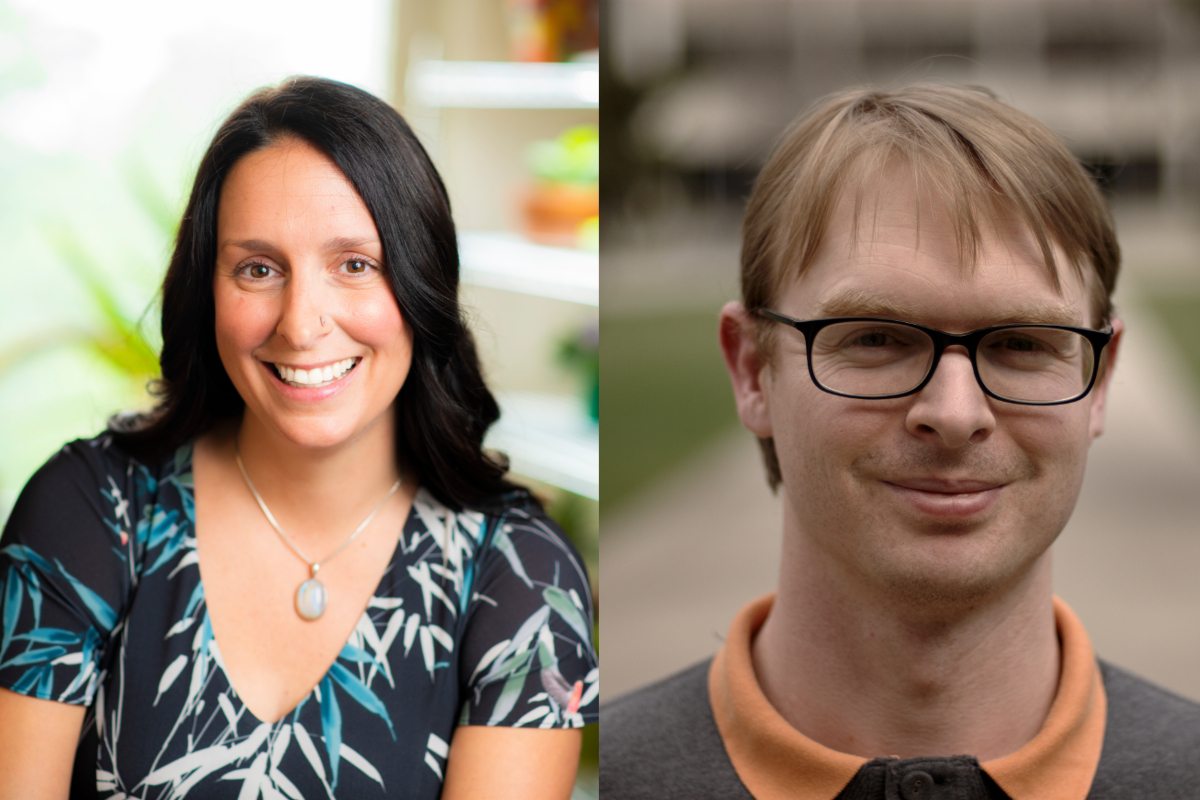
Lauren Guillette (left) and Abram Hindle (right) have been selected for the 2020 Science Fellowship at the TELUS World of Science in Edmonton.
Though their areas of expertise in animal cognition and computer software might be worlds apart, University of Alberta faculty members Lauren Guillette and Abram Hindle have many things in common—not least of which is a passion for sharing their love of science with the world. And it is just such a passion that led to this pair being selected for the 2020 Science Fellowship at the TELUS World of Science in Edmonton (TWoSE).
[This article was updated on October 23rd, 2020, to reflect new initiatives by both Guillette and Hindle.]
Guillette, an assistant professor in the University of Alberta’s Department of Psychology, is an expert in animal cognition and behaviour with a particular focus on nest-building in birds. “My work on social learning in animals is interesting to both scientists and to the public because we humans are such social creatures,” said Guillette. “In fact, it is our human ability to learn from one another that has been proposed as the basis of cultural evolution.”
Through the course of the 2020 fellowship, Guillette hopes to work with TWoSE to build a nest-building exhibit. “There is real potential for educating and engaging school children, in both rural and urban settings, about local animal behaviour, as nest building is so ubiquitous,” she added.
Guillette is working with the education officer at the TELUS World of Science and an undergraduate independent studies student from UAlberta to create a deliverable at-home or in-class activity about nest-building behaviour of local birds. This activity is being made for two different age groups, 1st and 9th graders to fit into the Alberta curriculum.
Diverse expertise
An associate professor in the Department of Computing Science, Hindle is an expert in software and programming. “My research revolves around three main areas: the energy consumption of software systems, studying programmers by their output and improving their productivity, and how software engineering can help computer musicians,” said Hindle.
Technical terminology and complex language can be a barrier for community members interested in learning more about computing science. During his tenure as a TWoSE Science Fellow, Hindle plans to work with the community to build meaningful tools and language to address this issue and reduce the barrier to entry into his field. “I want to help the community understand the breadth of research within computing science—especially the creative areas,” said Hindle. “I want to encourage students to enter computer science and software engineering regardless of their background and demographics.”
For Science Literacy Week 2020. Abram discusses one of his favourite science books in a column featured by the TELUS World of Science and shared an experiment, inspired by that book, using marbles and tubes to simulate the essence of chaos.
Now in its third year, the fellowship recognizes an outstanding researcher or innovator based in Northern Alberta. As the 2020 fellows, Guillette and Hindle will receive a monetary award and a professional development scholarship. Throughout the year, they will deliver and participate in public programming at the centre. TWoSE’s inaugural science fellow was physicist Gregory Sivakoff in 2018, followed by mathematician Vincent Bouchard in 2019.
“We’re very much looking forward to having Guillette and Hindle on board as members of the TELUS World of Science team,” said Alan Nursall (’81 MSc), president and CEO of TWoSE. “Connecting and collaborating with other science communicators is an exciting endeavor and our team is eager to see what this year’s Science Fellows will bring to the community.”
A proud partner of TWoSE, the University of Alberta’s Faculty of Science is also pleased to announce that Dean Matina Kalcounis-Rueppell is one of the newest members of the TWoSE board.
Learn more about community engagement activities, such as public lectures and programming, offered by the University of Alberta’s Faculty of Science.